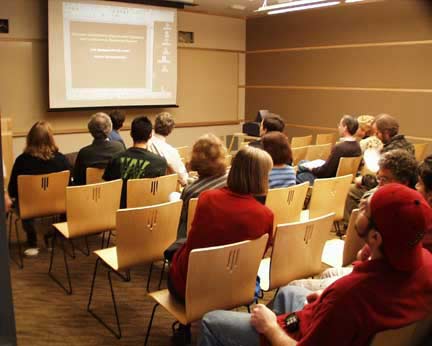精彩對(duì)白:You're dead, Carl. You say no to life, and therefore you're not living. You make up excuses to the people around you and to yourself.
Seminar

Seminar is, generally, a form of academic instruction, either at a university or offered by a commercial or professional organization. It has the function of bringing together small groups for recurring meetings, focusing each time on some particular subject, in which everyone present is requested to actively participate. This is often accomplished through an ongoing Socratic dialogue with a seminar leader or instructor, or through a more formal presentation of research. Normally, participants must not be beginners in the field under discussion (at US universities, seminar classes are generally reserved for upper-class students, although at UK and Australian universities seminars are often used for all years). The idea behind the seminar system is to familiarize students more extensively with the methodology of their chosen subject and also to allow them to interact with examples of the practical problems that always occur during research work. It is essentially a place where assigned readings are discussed, questions can be raised and debates can be conducted. It is relatively informal, at least compared to the lecture system of academic instruction.
In some European universities, a seminar may be a large lecture course, especially when conducted by a renowned thinker (regardless of the size of the audience or the scope of student participation in discussion). Some non-English speaking countries in Europe use the word seminar (e.g., German Seminar, Slovenian seminar, etc.) to refer to a university class that includes a term paper or project, as opposed to a lecture class (i.e., German Vorlesung, Slovenian predavanje, etc.). This does not correspond to English use of the term.
Increasingly, the term "seminar" is used to describe a commercial event (though sometimes free to attend) where delegates are given information and instruction in a subject such as property investing, other types of investing, Internet marketing, self-improvement or a wide range of topics, by experts in that field.
考考你
1. 我說(shuō)服他買下這個(gè)房子。
2. 這氣味喚起我孩提時(shí)代的記憶。
3. 敵對(duì)的國(guó)家簽署了裁剪軍備條約。
4. 你有沒(méi)有旁聽(tīng)其他課?
Yes Man《好好先生》精講之二 參考答案
1. When I realized what a stupid mistake I had made, I felt like a fool.
2. He comes down with flu and is tied down in bed.
3. He ended up as head of the firm.
4. I don't know how to make it up to her.
精彩對(duì)白:You're dead, Carl. You say no to life, and therefore you're not living. You make up excuses to the people around you and to yourself.
(英語(yǔ)點(diǎn)津 Danny編輯)
點(diǎn)擊進(jìn)入更多精彩電影回顧